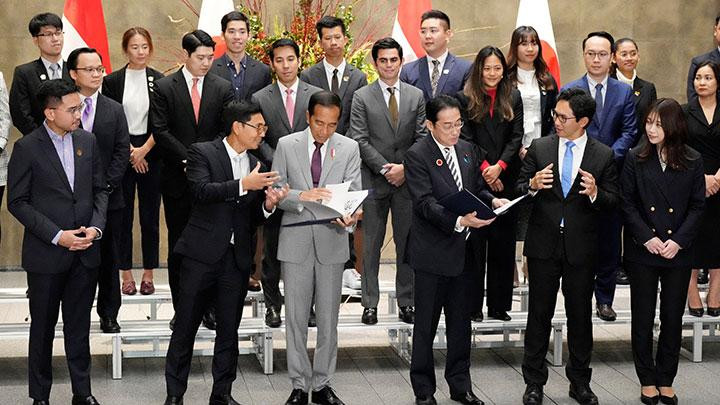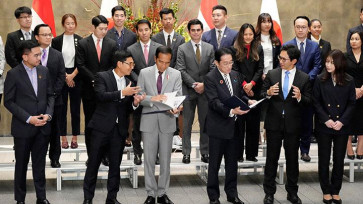Popular Reads
Top Results
Can't find what you're looking for?
View all search resultsPopular Reads
Top Results
Can't find what you're looking for?
View all search resultsNavigating global complexities: Strengthening ASEAN-Japan collaboration
Addressing concerns about China's trade practices, Japan, alongside other advanced nations, must prioritize ensuring the effective operation of the World Trade Organization (WTO) and preventing measures that may fragment global trade.
Change text size
Gift Premium Articles
to Anyone
 Gen Z-Boomer pic: Japanese Prime Minister Fumio Kishida (center right, front row) and Indonesian President Joko “Jokowi” Widodo (center left, front row) browse documents on Dec. 16, 2023 at Kishida’s official residence in Tokyo, during a photo shoot with participants of the ASEAN-Japan Generation Z Business Leaders Summit. The gathering was held as a side event of the ASEAN-Japan Commemorative Summit to mark 50 years of friendship and cooperation. (Reuters/Pool/Eugene Hoshiko)
Gen Z-Boomer pic: Japanese Prime Minister Fumio Kishida (center right, front row) and Indonesian President Joko “Jokowi” Widodo (center left, front row) browse documents on Dec. 16, 2023 at Kishida’s official residence in Tokyo, during a photo shoot with participants of the ASEAN-Japan Generation Z Business Leaders Summit. The gathering was held as a side event of the ASEAN-Japan Commemorative Summit to mark 50 years of friendship and cooperation. (Reuters/Pool/Eugene Hoshiko)
T
he relationship between ASEAN member states and Japan has stood as a testament to enduring collaboration, spanning five decades since the Japan-ASEAN Synthetic Rubber Forum in 1973. This partnership, built on principles of peace, stability, development and prosperity, has flourished, positioning Japan as a pivotal trade and investment partner for ASEAN.
As of 2022, trade between ASEAN and Japan has seen remarkable growth, marking an upward trajectory. With ASEAN's exports to Japan reaching US$135.6 billion and imports from Japan totaling $119.1 billion, Japan stands as the second-largest source of foreign direct investment (FDI) for ASEAN, contributing $27.2 billion in 2022 alone, reflecting a nearly 30 percent surge from 2021.
However, in today’s complex geopolitical landscape, where tensions between global powers loom large, ASEAN endeavors to maintain neutrality and strengthen collaborations with various trade and economic partners, including China, Japan and the United States. The emphasis is on deepening regional integration, promoting economic diversification and enhancing overall competitiveness. To achieve these goals, Japan and ASEAN must optimize the ASEAN-Japan Free Trade Agreement (FTA) and Regional Comprehensive Economic Partnership (RCEP) frameworks.
Amid rising global tensions, Japan must avoid aligning with any single power bloc and, instead, prioritize fostering mutually beneficial economic partnerships. Adopting a neutral stance in the US-China rivalry and concentrating on enhancing multilateral trade systems will contribute to cultivating stability and prosperity within the region. The imposition of unilateral actions, such as the Group of Seven’s anti-coercion measures against China, poses the risk of detrimental economic consequences for Japan and other G7 countries.
Specifically targeting China through anti-coercion measures, including tariffs and other protectionist strategies, presents inherent risks due to China's substantial share of Japan's exports. Notably, in 2022, China accounted for 19.37 percent of Japan's total exports to the world – a remarkable 57-fold increase since 2000. Japan's substantial investment in China, ranking as the fourth-largest source of foreign direct investment (FDI) with $4.6 billion in 2022, further underscores the complexities inherent in their economic relationship.
Addressing concerns about China's trade practices, Japan, alongside other advanced nations, must prioritize ensuring the effective operation of the World Trade Organization (WTO) and preventing measures that may fragment global trade. This aligns with Article 7 of the chairman’s statement of the 26th ASEAN-Japan Summit last September in Jakarta. A thoughtful strategy adopted by Japan and the G7 can guide global trade positively, avoiding unintended consequences associated with a more aggressive approach to China's non-transparent and market-distorting industrial policies.
The ASEAN-Japan Summit in Tokyo on Dec. 16-18 should extend beyond commemorating the golden anniversary. The summit presents an opportunity for both ASEAN and Japan to reaffirm their commitment to the multilateral trading system, emphasizing collaboration over unilateral actions and prioritizing regional trade and investment enhancements.


















